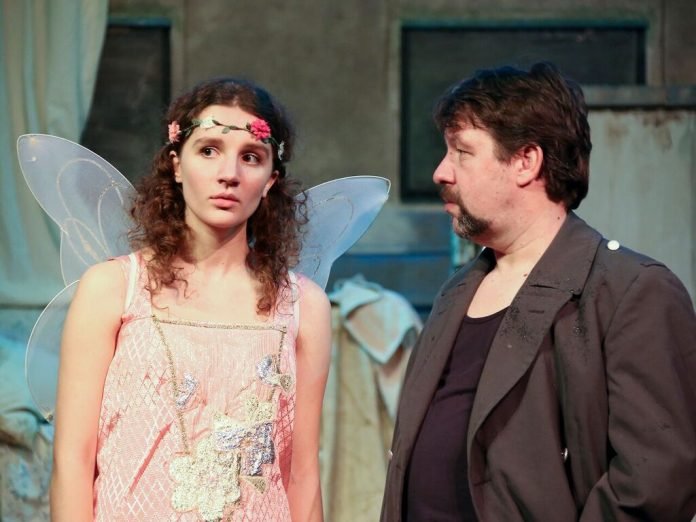Jerusalem, the anthem of the Women’s Institute, and popular hymn, is a symbol of England and its “Green and Pleasant Land”. Jerusalem the play, written by St. Albans local Jez Butterworth, is a completely different kettle of fish. First performed at The Royal Court in 2009, to great acclaim, it is set in the archetypal English village of Flintock, in the heart of Wiltshire, and covers twenty four hours in the life of Johnny “Rooster” Byron.
The play opens on the morning of the local St. George’s Day fair, and we discover that Johnny Byron is both the most and least popular man in town. The local authorities want to evict him, the town thug wants to teach him a lesson, and his ragtag group of friends want to party with him. From his ancient mobile home in some woods near the new housing estate, Johnny peddles drugs to teenagers, holds raucous parties and entertains anyone who will listen with his tall tales of past adventures.
While the good citizens of Flintock celebrate with Morris Dancing and a May Queen, the antics of “Rooster” and his band of “undesirables”, to which they so object, are far closer to the springtime rituals of “Ye Olde England” than their pallid interpretations of tradition could ever be.
According to Director Jenny Kilcast, we like to sanitise our folklore. “Robin Hood, for instance, one of our best-known outlaws, has become a national hero. Johnny Byron embodies many of the characters of traditional English myth; Oberon, king of the fairies; Hern the Hunter with his antlers; the Green Man, symbol of Spring. Is he the hero or the villain? St. George or the dragon? The big bad wolf or the heroic huntsman?”
Johnny incarnates the spirit of a mythic England that may never have been, but that everyone, on some level, longs for. One of his regular visitors is the “professor”, played by Terry Prince. A retired college teacher, he is fascinated by “St. George and all the lost ghosts of England”. For Terry, the “Professor” sees Johnny as “a living representative of these folk characters who lived free from constraint, and who abandoned themselves to the rhythms of the earth. Sadly he is losing his grip on reality as his memory fades. He is a harmless soul though, who brings out the caring side in the otherwise selfish Byron.”
Katie Walton is playing one of the teenage hangers-on, Phaedra, who is also Queen of the May, and something of an elusive character. “You are never quite sure who she is. The possibility that she is a fairy changeling is never dismissed. On the other hand there is a darker side to her. She is running from something.”
“The play is funny, filthy in places, fantastical in others, and an incredible mix of ferocity and tenderness. It has vibrant characters, verdant scenery, rich and satisfying layers in the writing, and very strong language. Jerusalem plays with the lines between fiction and reality, embracing the legends of long-lost England. It’s also a stark and gritty look at the underbelly of society and the darkness of our time.”
Performances take place on the Main Stage from Friday 10th to Saturday 11th November at 8pm; Sunday 12th November at 2.30pm and from Tuesday 14th to Saturday 18th November at 8pm. To book tickets go to www.abbeytheatre.org.uk or call the box office on 01727 857861.







